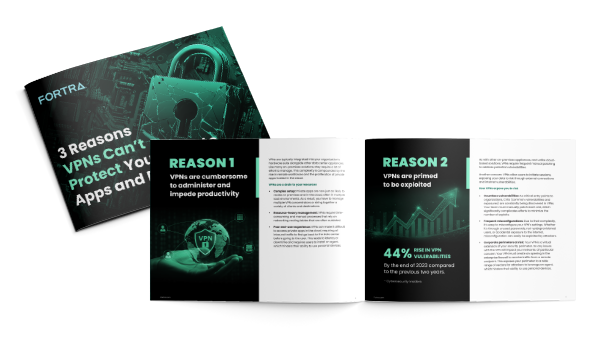Designed for only traditional network architectures, VPNs are an outdated solution that no longer meet the security needs of today’s multi-cloud environments. VPNs are difficult to scale, complex to manage, impact user performance, and are full of vulnerabilities — putting your data at risk.
VPNs Do Not Effectively Secure Remote Work
VPNs provide remote users access to private networks, however:
- What endpoints can they use?
- What resources can they access?
- What data are they accessing, and what are they doing with that data?
Three Reasons VPNs Can’t Protect Your Private Apps and Data
VPNs are cumbersome to administer and impede productivity
VPNs are typically integrated into your organization’s hardware suite alongside other data center appliances. Like many on-premises solutions, they require a lot of effort to manage. This complexity is compounded by the rise in remote workforces and the proliferation of private apps hosted in the cloud.
VPNs are primed to be exploited
As with other on-premises appliances, and unlike cloud-based solutions, VPNs require frequent manual patching to address potential vulnerabilities.
Another concern: VPNs allow users to initiate sessions, exposing your data to risk through external connections and internet vulnerabilities.
VPN defenses can be easily circumvented
Breaches often start with compromised accounts. These attacks succeed because static verifications that VPN uses, like passwords and MFAs can be circumvented. And once a user is connected, organizations have no visibility into how they’re interacting with apps and data.

Download the eBook
Why is perimeter-based data security a thing of the past? To effectively safeguard your data you need to first understand the shortcomings of VPNs. This eBook outlines the three reasons why VPNs are inadequate in today’s cloud-first, hybrid work environment.
The Solution
VPNs serve a wide range of use cases, but many of those use cases are outdated. If anything, VPNs’ static security measures are no longer adequate, nor do they help with productivity.
Zero trust network access (ZTNA) has emerged as a viable alternative to VPNs, with focus on per-app access and enforcing the principles of zero trust. In order to protect the data in your private apps, it’s time to make this shift – and Fortra can help.
Take a Quick Self-Guided Product Tour
Business Outcomes

Reduce the attack surface.

Minimize vulnerabilities.
